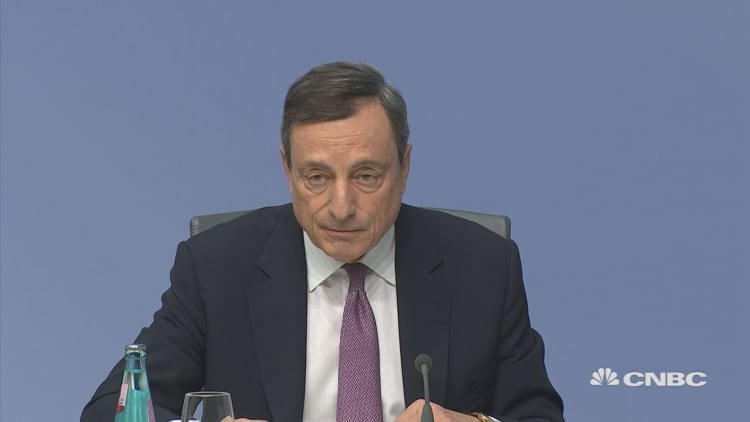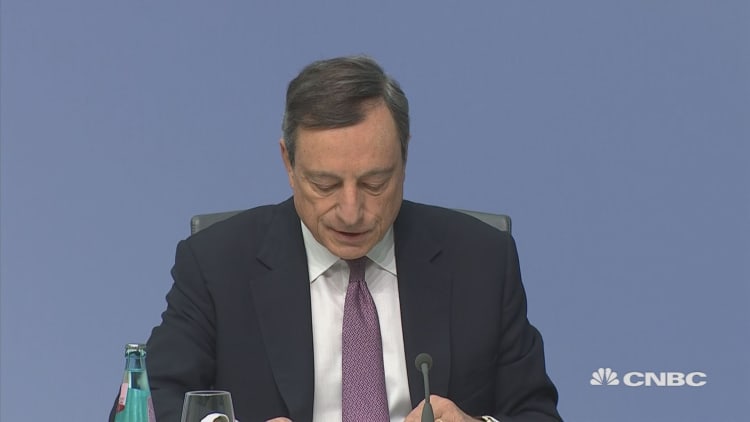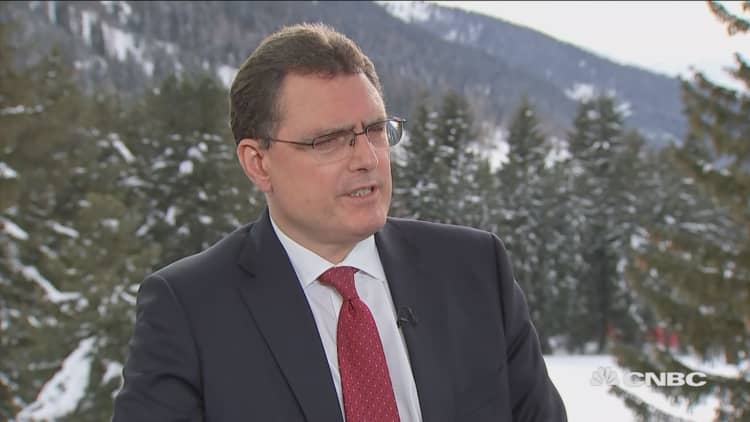
The euro surged Thursday afternoon to a new three-year high as doubts grew over the future of the European Central Bank's (ECB) stimulus program.
The currency hit the $1.25 level against the U.S. dollar around 2:00 p.m. London time and was on track for its biggest weekly rise since May of last year. Traders noted that, despite comments from ECB President Mario Draghi on Thursday afternoon, they remain convinced that easy monetary policy in the region is coming to an end.
"Draghi failed to surprise the market," Jane Foley, head of foreign exchange strategy at Rabobank, told CNBC over the phone. "The economic data is too strong," she said, adding that investors are therefore convinced that the central bank will have to tighten its policy, despite giving the opposite message on Thursday.
After a routine rate decision for the euro zone's central bank, Draghi spoke at a press conference Thursday, telling reporters that the recent volatility in the exchange rate is a "source of uncertainty." He added that it would therefore require monitoring.

However, he used the same wording back in September — a repetition that markets perceived as a lack of concern over the strength of the euro and thus an indication that the ECB will end up tightening its policy. Draghi nonetheless reiterated that the bank will keep its stimulus for as long as needed and stated that there are "very few chances" that it will change interest rates this year.
The euro has been on an upward trend against other currencies, including the U.S. dollar, for the past few weeks as the region's economy keeps improving and political risks dissipate. However, a stronger euro could hurt European exports and affect inflation in the euro zone — which the central bank has tried to support in the last few years — potentially prompting a change in its policy.
No change in policy
Earlier on Thursday, the ECB left its benchmark interest rate unchanged. Its interest rate on the main refinancing operations, the interest rates on the marginal lending facility and the deposit facility were kept at zero, 0.25 and -0.40 percent, respectively.

Earlier in the month, the ECB's December meeting minutes said the central bank should revisit its communication stance in "early" 2018, prompting market participants to forecast policymakers were preparing to reduce their massive monetary stimulus program. The minutes, which were published on January 11, immediately pushed the euro more than 0.7 percent higher against the dollar, extending the single currency's rally throughout the opening days of the calendar year.
Broad economic recovery
By the end of trade on Wednesday, the euro had gained more than 2 percent since the start of 2018, as a broadening recovery bolstered expectations the ECB may be forced to unwind its policy stimulus sooner than forecast. The euro zone is seeing its best economic growth in a decade, leading economists and policymakers to upwardly revise their economic forecasts for several major European countries. Late last year, the ECB increased its growth forecast for 2018 to 2.3 percent, up from 1.8 percent previously.
Nonetheless, the ECB has long-struggled to bring up core inflation to its aim of about 2 percent and the central bank is not projected to meet its target level until 2020 at the earliest.
Late last year, the bank said headline inflation would be at 1.5 percent in 2017 and 1.2 percent in 2018.
In October, the ECB announced a reduction in the level of its monthly purchases from 60 billion euros ($71 billion) to 30 billion euros. At that time, the bank also said that its quantitative easing program would stay in place until September 2018. It kept the door open to further extensions in the program, depending on the economic conditions of the euro area.



